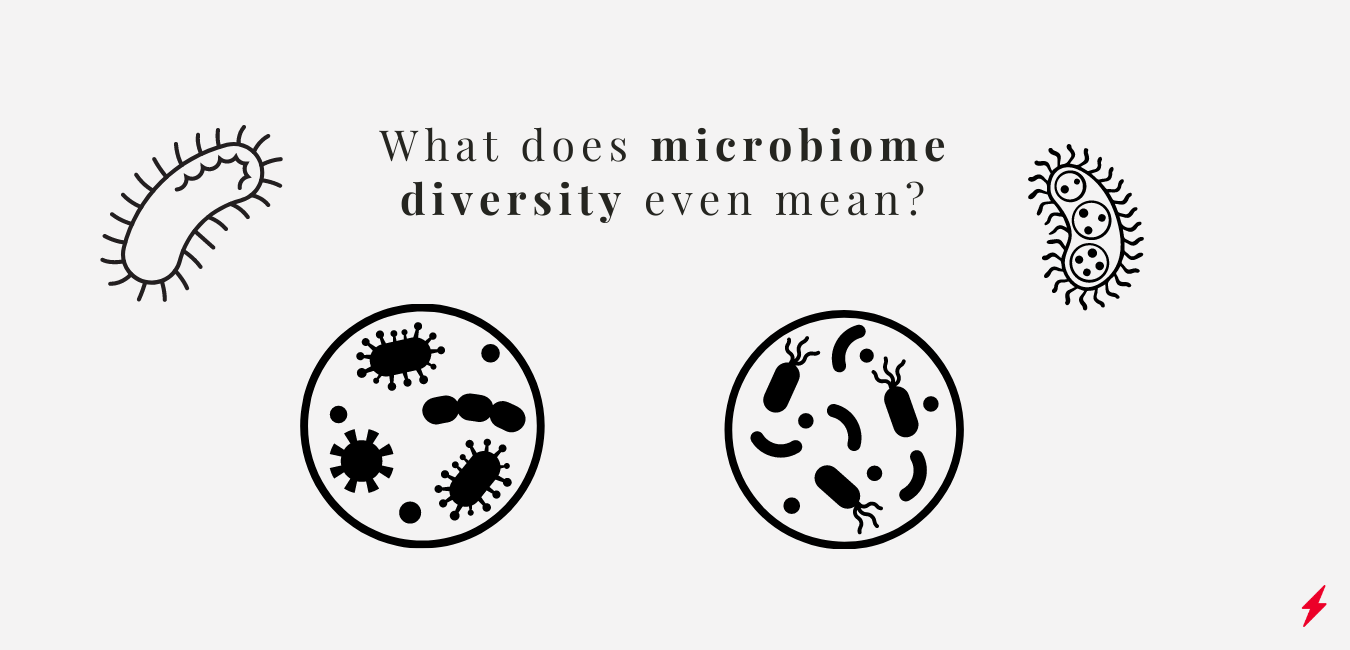
Life is about maintaining balance in all things, and your gut is no exception. Inside your gastrointestinal tract (the mouth-to-rear digestive system “circuit”) are various species of beneficial bacteria, and these little critters are really important for your well-being. In fact, having few or unbalanced microbial members is associated with many mental and physical health problems (1).
What does microbiome diversity even mean?
Well, it actually consists of two parts: “bacterial richness” and “bacterial evenness”. Your gut microbes do many important tasks, such as aiding your digestion and protecting you from infection by nasty stuff (such as dangerous bacteria) (2). Different bacterial types in your gut have job “specializations” - for example, both Lactobacillus and Bacteriodes bacterial groups aid with digestion, but they help digest different types of food (3). Given this, it’s important to have many different types of workers to get all the necessary jobs done. This is “bacterial richness”, or the number of bacterial species you have in your gut (4). Also important is the balance between bacteria types, or “bacterial evenness”. If your gut has tons of Bacteriodes and almost no Lactobacillus, certain jobs will get done slower or poorly due to fewer workers in that specific group.
Issues with low microbial diversity
Unhealthily low microbial diversity (which is sometimes called “dysbiosis”) is associated with many health problems (5). Logically, having fewer and/or unbalanced gut bacteria to digest and protect your gut would lead to – you guessed it – more digestion issues and gut infections. Low diversity/dysbiosis is associated with general digestive complaints (e.g. constipation (6)) and chronic issues such as IBS (7,8). Issues with microbial diversity are also associated with higher rates of “bad” bacteria colonizing your gut (9,10) and higher levels of gut inflammation (11). Interestingly, gut bacteria diversity is at its peak when you’re a healthy adult and is lower right after birth (12) and in old age (13).
Lower bacterial diversity has also been connected to more specific wellness woes. It’s linked to obesity (14) and metabolic syndrome (15), though whether poor diet has caused both diversity issues and health issues is hard to determine. Abnormal microbial diversity has been shown in those with diagnosed anxiety (16) and depression (17), and supplementation of depressed patient’s bacteria into rats led to rodent displays of depressive symptoms (18). Older folks that are more physically frail (19) or who develop Alzheimer’s (20) are more likely to have depleted diversity as well. It’s worth noting that much of this data is still just correlations, and we don’t know yet if low diversity is actually involved in disease or disorder development. However, poor microbial diversity still causes plenty of unpleasant stuff (see above), so it can’t hurt to keep your gut happy!
Good news there: achieving bacterial diversity and balance is straight-forward and manageable.
How to diversify your microbiome
The key to keeping a varied microbiome is a good diet. Just like you, your hard-working gut bacteria need food! To survive and thrive, bacteria feed on the fiber in your diet, which means that eating high levels of fruits and veggies is important (21). In order to get a diversity of bacteria, you should eat diversely – a boring diet can lead to a boring microbiome (22). Taking digestive enzymes may help with this diet diversification by reducing your number of avoided “problem” foods and increasing the absorption of essential nutrients from said foods. Omega-3 fatty acids, or “healthy” fats found in foods such as fish, may benefit microbe diversity as well (23). And of course, eating natural probiotics like yogurt can give your microbiome a boost (24)!
Certain things are known to tank gut diversity. Consuming large numbers of prescription drugs may reduce gut bacteria numbers (25), particularly antibiotics (26), which can inadvertently kill off gut bacteria while destroying the “bad” bacteria it’s actually aimed at. And some types of diets such as the low-FODMAP diet (27) are associated with low diversity microbiomes.
So, it’s important to balance your life and your body. Be kind to your friendly microbe workers. If you take care of your gut, it might take care of you!
Citations:
- https://www.nejm.org/doi/10.1056/NEJMra1600266
- https://pubmed.ncbi.nlm.nih.gov/31460832/
- https://www.ncbi.nlm.nih.gov/pmc/articles/PMC4528021/
- https://www.ncbi.nlm.nih.gov/pmc/articles/PMC2443784/
- https://www.nature.com/articles/s41598-019-49452-y
- https://www.ncbi.nlm.nih.gov/pmc/articles/PMC6379309/
- https://www.ncbi.nlm.nih.gov/pmc/articles/PMC6494866/
- https://www.ncbi.nlm.nih.gov/pmc/articles/PMC6039952/
- https://www.ncbi.nlm.nih.gov/pmc/articles/PMC6070193/
- https://www.ncbi.nlm.nih.gov/pmc/articles/PMC5788567/
- https://www.ncbi.nlm.nih.gov/pmc/articles/PMC6722800/
- https://www.ncbi.nlm.nih.gov/pmc/articles/PMC3376388/
- https://www.nature.com/articles/nature11319
- https://www.ejinme.com/article/S0953-6205(17)30413-2/
- https://www.ncbi.nlm.nih.gov/pmc/articles/PMC6763239/
- https://www.ncbi.nlm.nih.gov/pmc/articles/PMC6551444/
- https://www.ncbi.nlm.nih.gov/pmc/articles/PMC7299157/
- https://www.sciencedirect.com/science/article/pii/S0022395616301571?via%3Dihub
- https://www.ncbi.nlm.nih.gov/pmc/articles/PMC4731918/
- https://www.ncbi.nlm.nih.gov/pmc/articles/PMC5648830/
- https://www.ncbi.nlm.nih.gov/pmc/articles/PMC4949558/
- https://www.sciencedirect.com/science/article/pii/S2212877816000387
- https://pubmed.ncbi.nlm.nih.gov/28894110/
- https://www.webmd.com/digestive-disorders/what-are-probiotics
- https://pubmed.ncbi.nlm.nih.gov/29205415/
- https://pubmed.ncbi.nlm.nih.gov/26855324/
- https://www.ncbi.nlm.nih.gov/pmc/articles/PMC6413021/
